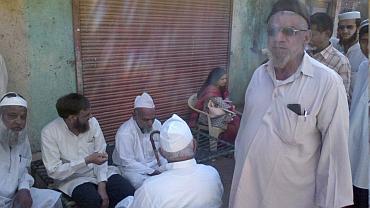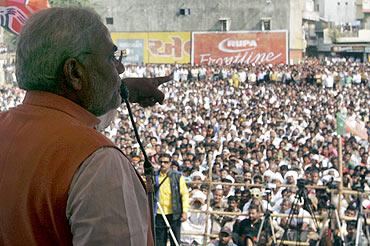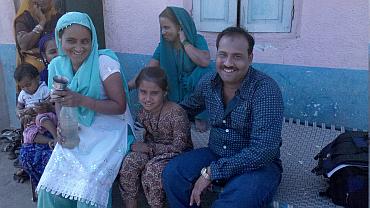
Krishnakumar Padmanabhan finds hope, despair and anger in Godhra
February 23, Godhra's Signal Falia area is buzzing. The previous night, police buses carrying 63 people acquitted in the 2002 Sabarmati Express-burning case had arrived from the Sabarmati Central Prison, Ahmedabad.
These were people who had lost nine years of their lives because they were caught in the crossfire in a battle between the state government and civil activists, who disagreed on how the case should be conducted. In the police buses were people who had never seen their children. There were people who could not perform their fathers' last rites.
Though the police had long ago accepted that at least 70 of the 134 accused in the case would be acquitted, the application of the now-repealed Prevention of Terrorism Act and the subsequent legal delay meant that they had to spend nine years in jail.
Chief among those acquitted is Maulvi Hussain Omerjee, the chief Muslim religious leader in Godhra. The police charge-sheet had named him as the key conspirator. The court disagreed, though it upheld the state police's contention that the burning of the S-6 coach of the Sabarmati Express was a conspiracy.
"I did not know if I would see my father alive ever," says Saeed Omerjee, the Maulvi's son. "We belong to a family that has fought for India's freedom. (India's first home minister) Sardar (Vallabhbhai) Patel sat where you are sitting now. Meetings used to happen in this house at the time of the freedom struggle. Apart from that, we know of no conspiracy. My father was such a law-abiding citizen that once, when he got a notice from the sales tax asking for a harmless explanation, he was petrified and rushed to their office to explain things."

Ten months after that incident, the Maulana was arrested on the basis of an 18-year-old criminal's confession.
"It was on the basis of hearsay from a known criminal that my father was arrested," says Saeed. "The police case itself says the petrol (used to set the coach afire) was purchased first and the train timing was noted. Then, the charge-sheet says, the mob assembled and asked Maulana for directions. How is this possible? They just cooked up a story and attached my father's name on top!"
The years that followed were hell for Saeed, who had to set aside his work for the family's business and devote his full attention to the case.
"I learned a lot about the legalities of the land," he says. "Earlier, I knew nothing. So much so that the police, in an effort to muzzle me, added me as a suspect in the case and started spreading rumours about me."
The family is trying to leave the past behind.
"This is not something we are going to distribute sweets for," says Saeed, who has helped the families of the others accused in the case. "The battle is only half won. I have got justice, but there are so many who haven't gotten it. Of the 31 convicted, a lot of people are innocent."
"It takes one day to apply POTA, and eight years to clear your name after that. Don't ask us if this is a win for us. What happened to my father is a crime," he retorts.
Another high-profile name in the case is Mohammed Hussain Kalota, the then president of the Godhra municipality.
"As the municipality president, he was the first citizen of Godhra," says a relative who does not want to be named. "He rushed to the railway station along with the collector and the town's police chief. If he doesn't go to the spot, who will? They arrested him saying he was the chief conspirator. Then they said the Maulana was the main conspirator."
People close to Kalota believe that his becoming the civic chief had angered many in the majority community.
"They couldn't digest that someone from the minority became a president. The Congress party too soon abandoned him," says one such person.
The Maulana and Kalota had some kind of support system. But most others who were arrested were daily wage laborers and the sole breadwinners of their large families.
Shameem Banu's husband was one of them. "My husband was working in the house when the cops came and asked him to come to the station," Banu says. "For six months after that, we did not know where he was. They first filed a case of theft against him. Then they produced him in a court 40 kilometers from here, silently attaching his name to the Godhra incident."
Bibi Khatoon Sultan Khan is 60. Her three sons were painters. "The day of the incident, the cops came with their faces covered and told my sons, 'show your faces at the police station.' That was the last I saw of them."
While they were in jail, the brothers lost their father, and were not allowed to come for his last rites. "A man with three sons could not get four people to carry him for 40 paces. What kind of death is that," asks Bibi Khatoon. To provide for her three daughters-in-law and her seven grandchildren, she took up a labourer's job at a neighboring factory. I lifted 40 kg every day in the factory and earned what little I could at this old age," she says. "There are two bright kids at home. We stopped their studies; they are working now."

When her sons were arrested, one of Bibi Khatoon's daughters-in-law was six months pregnant. "My son has seen his daughter only three times. When he came back yesterday, she asked who he was. She does not recognise her father," says Bibi Khatoon.She cannot forget the last nine years. "I have fed leftovers to my grandchildren," she says. "We have begged for food. We have gone hungry for days on end. A roti with my morning tea used to be my only meal. Nine years who is responsible?"
But when her sons Nashir Khan, Sadiq Khan and Samsher Khan return, she is jubilant. So is the entire family. Neighbours come out to receive them.
Sadiq, whose daughter Shaheeda is yet to come to terms that she will now have her father with her all the time, does not talk about the family. He does not talk about the nine years he has lost. He only has one thing to say. "The other 31 are also innocent. They should be released. Catch those who did the crime. Not these people," he says.
Those present are shocked when his father-in-law, who has come to meet him, says, "Whatever happened is for your own good." The father-in-law explains: "These boys never went to the mosque. Nor did they perform namaaz even once a day. In the jail, they prayed five times every day. Now, at least, they will be men of faith."

Nafeesa, who went blind a few years ago, says, "I cried so much I lost my sight." That day is a double treat. Her husband Anwar Ansari, who became mentally unstable and left the house, is also providentially back. He talks in snatches, taking time to comprehend questions.
"I felt like coming back," he says. "Who are these guys They are my sons? I remember now They were in jail "
Nafeesa is torn between the grief of having to see her unstable husband who abandoned her, and having her sons back.
"How many times have you come here," she asks a journalist. "And how many times have you seen this man at the house? He just abandoned me at the worst time in my life. But now, my sons are back!"
Shabbir and Alladin are thinking of setting up the bakery again. They do not want to talk to the media. After a bit of prodding, Sahbbir says he is not bitter.
"We are born after spending nine months in our mother's womb," he says. "Now I consider this as a new birth for me; only, I spent nine years in jail. I will start my life afresh. I have no bitterness against anything or anybody. But the system must be changed. Just to prove that one is innocent should not take nine years."
Shabbir and his brother too were not particularly religious. They too turned religious in the prison.
"Now, whatever work I have, I will not neglect my faith," Shabbir says. "That is what kept me going when we were in jail. God helped me get out of this."
But for Sogra Bibi Badam, 70, the nightmare continues. She has four sons, all of whom were arrested.
"I live alone," she says on judgment day. "My daughters-in-law live nearby with their families for the time being. They will come back once my sons are back." No one has told her that her sons are convicted.